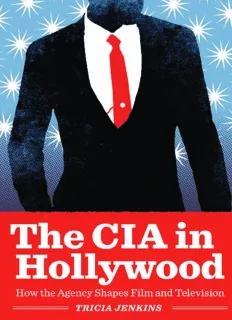
The CIA in Hollywood: How the Agency Shapes Film and Television PDF
Preview The CIA in Hollywood: How the Agency Shapes Film and Television
The CIA in Hollywood THIS PAGE INTENTIONALLY LEFT BLANK The CIA in Hollywood How the Agency Shapes Film and Television tricia jenkins University of Texas Press Austin Copyright © 2012 by University of Texas Press All rights reserved Printed in the United States of America First edition, 2012 Requests for permission to reproduce material from this work should be sent to: Permissions University of Texas Press P.O. Box 7819 Austin, TX 78713–7819 www.utexas.edu/utpress/about/bpermission.html ♾ The paper used in this book meets the minimum requirements of ansi/niso z39.48–1992 (r1997) (Permanence of Paper). Library of Congress Cataloging- in-P ublication Data Jenkins, Tricia. The CIA in Hollywood : how the agency shapes film and television / Tricia Jenkins. — 1st ed. p. cm. Includes bibliographical references and index. isbn 978-0-292-72861-5 (cloth : alk. paper) — isbn 978-0-292-73707-5 (e-book) 1. Spy films—United States—History and criticism. 2. United States. Central Intelligence Agency—In motion pictures. 3. Espionage in motion pictures. 4. Motion pictures—Political aspects—United States. 5. Motion picture industry—United States. 6. Spy television programs—United States—History and criticism. 7. United States. Central Intelligence Agency—Influence. I. Title. II. Title: Central Intelligence Agency in Hollywood. pn1995.9.s68j46 2011 791.43′651—dc23 2011027163 Contents Acknowledgments vii Introduction 1 1. Rogues, Assassins, and Buffoons: Representations of the CIA in Film and Television 14 2. Opening the Doors: Why and How the CIA Works with Hollywood 32 3. Necessary and Competent: The CIA in The Agency and In the Company of Spies 54 4. The Chase Brandon Years 73 5. The Legal and Ethical Implications of the CIA in Hollywood 97 6. The Last People We Want in Hollywood: The Retired CIA Officer and the Hollywood Docudrama 115 Conclusion 133 Notes 139 Bibliography 155 Index 165 THIS PAGE INTENTIONALLY LEFT BLANK Acknowledgments This book was a pleasure to research and write, largely because I got to interact with so many interesting people. These include former CIA direc- tors of public affairs Kent Harrington and Bill Harlow; current and retired CIA employees like Paula Weiss, Paul Barry, Robert Baer, Antonio and Jonna Mendez, John Strauchs, Nicholas Dujmovic, and Peter Ernest; and several entertainment professionals, including Michael Sands, Michael Frost Beckner, Jack Myers, David Houle, Bazzel Baz, James Grady, Peter Iliff, Matt Corman, and Chris Ord. Thanks to each of you for taking the time to answer my questions. This book would not have been possible without your help. Other people also aided my work on this book. I would specifically like to thank Matthew Alford and David Robb, who shared their resources, knowledge, and contacts with me. Nicholas Taylor, Joan McGettigan, Joel Timmer, Benjamin Martinez, Matthew Alford, and David Culbert also read some or all of this book and provided me with useful feedback as I went through the revision process. I would also like to express my ap- preciation to Sacred Heart University, which provided me with funds to travel to the CIA headquarters to interview Paul Barry in 2008, and to Texas Christian University for giving me a Junior Faculty Research Grant to complete this project. Most important, I would like to thank my husband, Nathanael O’Reilly, for his support and encouragement. He read every word of this book, often more than once, and offered several critical and editorial in- sights. He also watched more spy films and television series than any one man could reasonably expect to enjoy just so we could talk knowledgably about this topic together. Thank you. THIS PAGE INTENTIONALLY LEFT BLANK Introduction Agencies of the U.S. government have long employed entertainment liai- son officers to improve their public image in the mass media. For instance, the Federal Bureau of Investigation established an office in the 1930s to bolster its image in radio programs, films, and television shows, includ- ing G-Men (1935), TheFBIStory (1959), and TheF.B.I. (1965–1974). In 1947, the Department of Defense followed suit, and now the army, the navy, the air force, the marine corps, the coast guard, the Department of Homeland Security, and the Secret Service all have motion picture and television offices or official assistants to the media on their payroll. Even government centers are currently working with Tinseltown, as evidenced by Hollywood, Health, and Society—a program partially funded by the Centers for Disease Control and Prevention and the National Institutes of Health to provide the entertainment industry with information on health- related story lines. Despite the fact that it has existed since 1947, the Central Intelligence Agency was the last major government agency to establish formal rela- tions with the motion picture industry. In fact, it did not found a basic entertainment program until the early 1990s and did not hire Chase Bran- don as its first entertainment industry liaison officer until 1996. Perhaps because its efforts in film and television are relatively new, only a very small amount of scholarship has examined the CIA’s collaborations, mo- tivations, and methodologies in this field. The lack of scholarship is sur- prising, however, given that the Agency has already shaped the content of numerous film and television works, including JAG (1995–2005), Enemy oftheState (1998), IntheCompanyofSpies (1999), TheAgency (2001–2003), Alias (2001–2006), 24 (2001–2010), BadCompany (2002), TheSumofAll Fears (2002), TheRecruit (2003), CovertAffairs (2010–), and Argo (in pro-
Description: